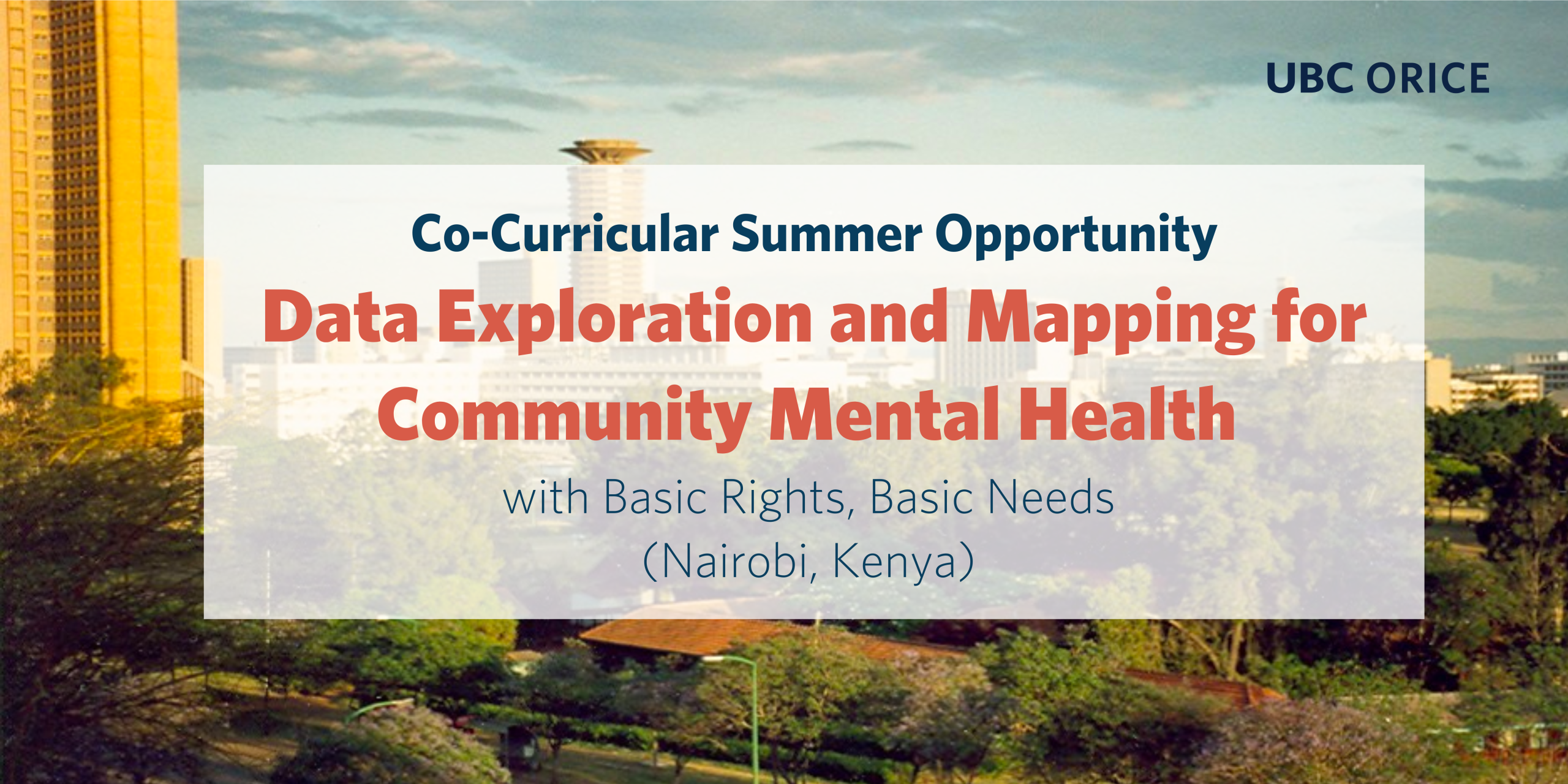
Applications for this program are closed.
*This course is eligible for the Regional and International Service Learning Award. Please see below for more information on Funding Opportunities or check out our Funding page here.
Program Overview
Eligibility Criteria
Open to all UBC students – upper-year students with some statistics / quantitative coursework preferred. Up to 4 placement spots are available.
Program Description
Basic Needs, Basic Rights (BNBR) is a vibrant registered national non-governmental organization located across seven counties in Kenya. One of BNBR’s core programmatic areas is to support people with mental health conditions, those at risk, and their caregivers to live and work successfully in their communities. BNBR strives to ensure that those with mental health concerns can access basic rights by empowering their communities to provide care and social support.
Since their inception, BNBR has distinguished itself as a leader in mental health and development in Kenya by implementing a model which takes a holistic approach comprising elements of psychosocial support, community development and livelihoods, and improving policy and practice through research and advocacy. This approach is informed by their belief that addressing mental wellbeing and illness goes beyond just health systems and must include consideration of social and economic causes and effects. BNBR seeks to prevent and treat mental health disorders; promote mental health and wellbeing; facilitate integration of individuals with mental health complications through socio-economic empowerment; influence laws, policies, and practices as well as cultural norms through acting as a collaborative leader; and to strengthen and diversify their resource base as an organization.
Over the years, BNBR has collaborated with academics and researchers to collect data on their various initiatives. These data have been used to publish papers by academics; however, it has not been analyzed to date by BNBR for their own purposes to understand program effectiveness and contribute to their policy advocacy and funding initiatives. Students placed with BNBR in summer 2024 will work with the organization to catalogue their existing data – understanding what the organization really would like to investigate/understand through research, what their core research priorities are, which questions have already been asked, the forms of data that have been collected (quantitative/qualitative), and where the gaps might be for BNBR. This is a critical yet often overlooked aspect of the research question, particularly in community-based research with organizations with whom data has already been collected, but not analyzed to address their core research priorities. At this stage, students will not be doing actual data / statistical analysis around a particular question, but will be exploring data with a view to data analysis being conducted in future. Students will be placed in Kenya with BNBR to gain a contextual understanding of the organization’s work and to observe their initiatives and programming – this will inform the research and data exploration work.
Students in this placement should be prepared to take initiative while working closely with the BNBR team, understanding their core focus is to provide mental health services in the community. However, a key pillar of their recent strategic planning is around researching and analyzing their programs, which is where student focus will be placed.
This placement is best suited for students in the 3rd or 4th year of their undergraduate programs who have some quantitative background (ie. quantitative / statistics courses at upper-year levels). Students should exhibit some interest in thinking about the role of data analysis in program design and policy advocacy, and in the work of BNBR through a meaningful connection to mental health, disability rights, community-based mental health programming, and access to mental health broadly. The program is open to students from all faculties.
Program Key Dates
| Dates | Activity |
|---|---|
| January 15th - February 4th | Applications are accepted until full OR until 11:59 pm on Sunday, February 4th, 2024. |
| Feb-April | Orientation and pre-departure learning sessions. All successful applicants will be expected to attend all sessions. |
| May / June | 8 weeks of fieldwork in an international immersive placement in Kenya. |
| TBD | Re-entry debrief. |
Pre-Departure Overview
The pre-departure learning program is designed to prepare you for an international placement. This will include:
- Pre-departure learning sessions taking place over the academic term leading up to departure led by staff and community development professionals;
- Creation of a learning and development plan;
- Participant-led events/presentations;
- Facilitated meetings with your placement team to explore learning topics;
- Post-placement activities.
Post-Placement Overview
You will participate in post-placement activities including:
- Debrief session in July 2024; and
- Public engagement presentation related to placement research in October 2024.
Program Fees
Program Fee: $3,900 – $4,400*
*Note: Program fees may be adjusted before the offer. Program costs vary primarily due to cost of living expenses and will be communicated if an adjustment is required.
Program fee includes:
- Pre-departure learning sessions at UBC
- Room and board
- Transportation from the airport to your placement site
- Orientation in the host country
- In-session debrief and workshop part way through your placement
- Reflection materials
- Community partner management fee
- Program management fee
Note: Additional expenses not covered in program costs are the responsibility of the student. Costs not included are airfare, visas, vaccinations, tuition, local transportation while in the country, transportation from the site back to the airport at the end of the placement, personal items, and daily incidentals.
Awards and Funding
Funding available for this program: Regional and International Service Learning Award.
Note: Students may only hold one award at a given time. Please visit the Funding page below for more information on the awards.
How To Apply
How to apply
For more information about the program and the course, please contact ORICE at ubc.orice@ubc.ca